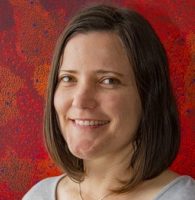
Dr Eliza Smith
Reflections on my Scope Global Development Internship
Earlier this year I was delighted to complete a Development Internship with KYEEMA Foundation. This is a scholarship program awarded through Scope Global to returned Australian Volunteers for International Development (AVID) looking to gain experience in the international or community development sector in Australia.
At the end of 2014 I returned from East Africa and was finishing up a continued contract with my original Australian Aid assignment host organisation – International Livestock Research Institute (ILRI) as a Livestock Research Officer. Although KYEEMA had been my Australian Partner Organisation (APO) for this assignment, I did not have the opportunity to understand the workings of the organisation, nor explore the various projects they deliver in any great depth during the course of the previous year and a half. As such I looked forward to working directly with them in their Brisbane office.
Through contributing to newsletter reports and partaking in meetings with Australian and African staff, I was able to gain an insight into KYEEMA work – what they have achieved, how they have achieved it, their current challenges and opportunities, and future directions. In particular I enjoyed attending a meeting of the Board where I was able to gain an initial understanding of organisational priorities and strategies for delivering improved family poultry and Newcastle disease control projects.
There was the opportunity to attend formal training through an Introduction to Aid and Development workshop with ACFID in Brisbane. For me, this was an interesting exercise in meeting other NGO representatives and learning about the work they do. It was also valuable to explore the new Australian Aid strategic framework and to reflect on new types of organisational collaborations needed and the importance of supporting environment services and delivering climate smart practices in all development projects.
I also contributed to compiling the Master Trainers’ curriculum for Laboratory Diagnosis of Newcastle Disease in African Member States. This gave me the time and focus to brush up on my understanding of Newcastle disease (ND), its surveillance and control. With technical staff Dr Mary Young and Professor Peter Spradbrow from KYEEMA, I was able to improve my knowledge of the different ND vaccines and their practical implementations, including I-2. It was indeed an honour to spend focused time with them both, hearing stories from the field and laboratory from the last twenty years or more.
I’m grateful to have been asked to give input into the new website and enthused to be part of making it more interactive and resourceful for stakeholders in project countries and communities. Also, to give KYEEMA a presence on social media so as to attract more people, including donors, to the work they do, and highlight the importance of supporting small-scale farmers and livestock initiatives as part of the development agenda. I also look forward to supporting the upcoming AVID assignment that ILRI will again host with KYEEMA as the APO. The position ‘Pork Value Chain Officer’, starting in November this year, will be primarily based in Vietnam, but will work with stakeholders in the pig value chain in Vietnam and in Uganda to strengthen South-South capacity and development solutions.


